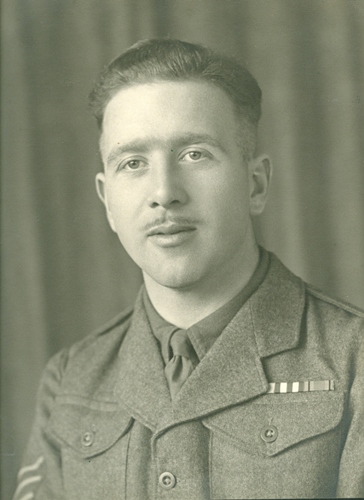Irish Guardsman Terry Flanagan, was in the same platoon as Joe Wilson, my Dad, during the Second World War. Joe’s platoon was in Normandy being shelled and they were pinned down in shallow trenches.
This is part of a transcript of an interview with Terry:
"I had just got 200 Gallaher Blues from my mother [in Belfast] in the post the day before. I opened them up and I was going to have a smoke but I had no matches. A few shells went over, a couple landed a way down a bit.
"Hey Joe, have you got any matches?" Joe was a helluva nice bloke, didn't curse, didn't smoke and a lovely boxer.
And Joe shouts back, "Yes I've got a box."
"Could you bring them over? I've cigarettes and no matches."
Joe says, "Well that's tough luck! If you have no matches you can come over here for them."
"Ach Joe, we're gettin' shelled!"
"I know, that's why I'm not going over there to your trench. Bring your smokes over here."
I says, "Well you don't smoke."
He said, "I never did, but I feel like one today with these shells!”
The Germans were shelling, oh aye and the odd one was thumping into the front bank.
So I needed a smoke badly. So I said “Alright.” And I got out, crawled over to Joe’s trench; I got into it. I’d a 20 packet with me, opened it up got a cigarette out and I gave him one and he says, “How do you smoke it?”
So we got the box of matches and we lit up. We’d smoked maybe half a cigarette and then we heard this thing coming. The sound of it, the scream of it. We hit the deck. There was an awful explosion right near us. It must have been a 120mm shell. And we looked up and looked out then and there was a big pall of smoke covering my trench.
And [stammering in disbelief] I said, "Joe … it went into my trench ... thank goodness I came over…"
"YES, and I didn’t go over there, or the two of us would have been mincemeat!!”
This must be a rare occasion when smoking proved good for the health.
The Irish Guards were often in the thick of it and only a handful of the original Normandy men survived the war.
Fortunately my Dad was one of the survivors: 1920 - 2011.
